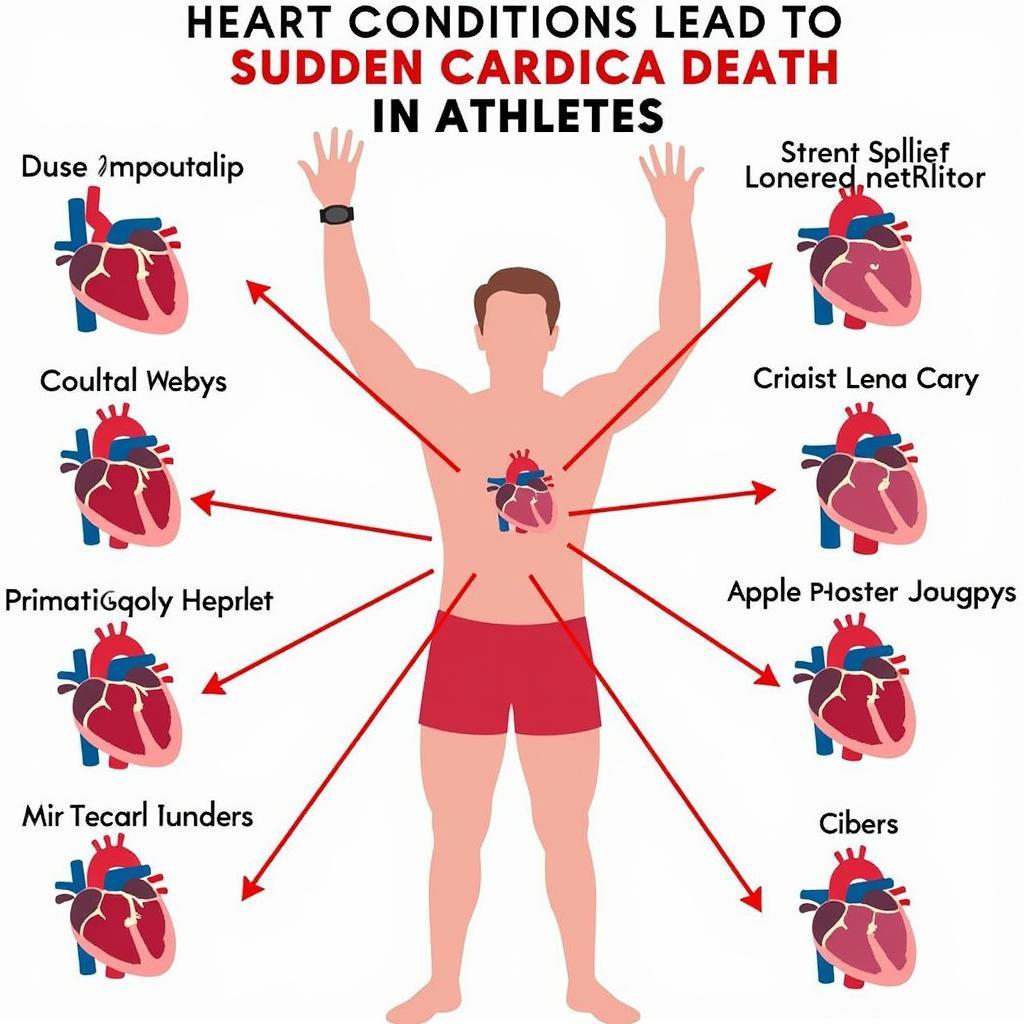Sudden Cardiac Death in Football Players
December 11, 2024Sudden cardiac death in football players is a tragic and often unexpected event that shocks the world. Within the last few years, we’ve witnessed several instances of these heartbreaking incidents, reminding us of the hidden dangers that can lurk beneath the surface of peak athleticism. This article aims to delve into the complexities of sudden cardiac death on the pitch, exploring the underlying causes, risk factors, preventative measures, and the emotional impact on families, teammates, and fans.
Understanding Sudden Cardiac Death in Athletes
Sudden cardiac death (SCD) is defined as an abrupt, unexpected death due to a cardiac cause, occurring within an hour of symptom onset. In athletes, this often happens during or immediately after intense physical activity. While seemingly rare, sudden cardiac death in football players garners significant attention due to the high-profile nature of the sport and the young, seemingly healthy individuals it affects.
Causes of Sudden Cardiac Death
Several underlying heart conditions can predispose athletes to SCD. These conditions can often go undetected during routine physical examinations. Some of the most common causes include:
- Hypertrophic Cardiomyopathy (HCM): A thickening of the heart muscle that can disrupt blood flow and electrical activity.
- Congenital Coronary Artery Anomalies: Abnormalities in the coronary arteries, the blood vessels supplying the heart.
- Arrhythmogenic Right Ventricular Cardiomyopathy (ARVC): The heart muscle in the right ventricle is replaced by fatty or fibrous tissue.
- Myocarditis: Inflammation of the heart muscle, often caused by viral infections.
- Commotio Cordis: A rare phenomenon where a sudden blow to the chest, at a specific point in the heart’s electrical cycle, can trigger a fatal arrhythmia.
 Common Causes of Sudden Cardiac Death in Athletes
Common Causes of Sudden Cardiac Death in Athletes
Recognizing the Risk Factors
While sudden cardiac death in athletes can be difficult to predict, certain risk factors can increase the likelihood of its occurrence. These include:
- Family history of SCD: A family history of sudden cardiac death, especially in young relatives, is a significant risk factor.
- Fainting or dizziness during exercise: These symptoms can indicate an underlying heart problem.
- Chest pain or shortness of breath during exertion: These symptoms should never be ignored.
- Unexplained seizures: Seizures, particularly during or after exercise, can be a warning sign.
 Recognizing Risk Factors for Sudden Cardiac Death
Recognizing Risk Factors for Sudden Cardiac Death
Prevention and Early Detection
The key to minimizing the risk of sudden cardiac death in football lies in prevention and early detection. The following measures can help:
- Pre-participation screening: Comprehensive pre-participation cardiovascular screening, including a detailed medical history, physical examination, and electrocardiogram (ECG), is crucial.
- Early recognition of symptoms: Educating athletes, coaches, and medical personnel about the potential warning signs of SCD is essential.
- Access to Automated External Defibrillators (AEDs): Having AEDs readily available at sporting events and training facilities can significantly improve survival rates.
- Emergency action plans: Developing and practicing emergency action plans for suspected SCD cases is critical.
What are the Symptoms of a Cardiac Event?
The most common symptoms include chest pain, shortness of breath, lightheadedness, and fainting. However, some individuals may experience no warning signs.
How Can AEDs Save Lives?
AEDs can analyze the heart’s rhythm and deliver an electric shock to restore a normal heartbeat if necessary. They are designed to be used by laypeople and can be life-saving in cases of sudden cardiac arrest.
Dr. Elena Martinez, a leading cardiologist specializing in athletic heart conditions, emphasizes the importance of early detection: “Early and comprehensive cardiac screening can identify underlying heart conditions before they become life-threatening. This is particularly important for athletes who put their hearts under increased stress during intense physical activity.”
The Emotional Toll of Sudden Cardiac Death
The sudden loss of a young athlete can have a devastating emotional impact on families, teammates, and the wider sporting community. Grief, shock, and disbelief are common reactions. It’s crucial to provide support and counseling to those affected by these tragedies.
Conclusion
Sudden cardiac death in football players is a sobering reminder of the fragility of life. While we can’t completely eliminate the risk, we can take significant steps towards prevention and early detection. By raising awareness, promoting comprehensive screening programs, and having appropriate emergency procedures in place, we can strive to protect the health and well-being of athletes and prevent future tragedies. Understanding and addressing sudden cardiac death in football players requires a collective effort from medical professionals, athletes, coaches, and sporting organizations to ensure a safer environment for everyone involved.
FAQ
- What is the most common cause of sudden cardiac death in young athletes? Hypertrophic cardiomyopathy (HCM) is often cited as the most common cause.
- Are there any warning signs of sudden cardiac death? Some individuals may experience warning signs such as fainting, chest pain, or shortness of breath during exercise, while others may have no symptoms.
- How effective are AEDs in saving lives? AEDs can significantly improve survival rates in cases of sudden cardiac arrest by restoring a normal heart rhythm.
- What can I do to reduce my risk of sudden cardiac death? Undergo regular checkups with your doctor, report any unusual symptoms, and avoid excessive exertion if you have any known heart conditions.
- Where can I find more information about sudden cardiac death in athletes? Consult with your doctor or search for reputable online resources from organizations like the American Heart Association.
- How often should athletes undergo cardiac screening? Consult with a medical professional to determine the appropriate screening frequency based on individual risk factors.
- What is the role of genetic testing in identifying individuals at risk of SCD? Genetic testing can be helpful in identifying certain inherited heart conditions that increase the risk of SCD.
For any support, please contact us: Phone: 0396443476, Email: [email protected] or visit us at: 23 Tháng 3, Đắk Nia, Gia Nghĩa, Đắk Nông, Vietnam. Our customer service team is available 24/7.